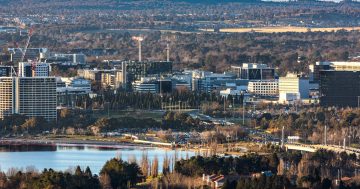
Working from home in the APS could become more of a thing. Photo: South Agency.
Everyone in the APS is talking about flexible working conditions and how the year ahead might shape up once new arrangements, including a right to work from home, kick in.
Flexible working arrangements for Australian Public Service employees were secured in APS-wide bargaining negotiations last year.
Agreements at agency level are expected to be finalised and positively voted on in time for the new set of conditions to start in March.
With a bias towards approving work-from-home requests soon to be formalised, the incoming flexibility policy will apply to all levels across the APS and all its agencies.
Each agency will manage its own arrangements, and supervisors must properly negotiate and approve work-from-home requests.
But with the pro-staff bias being included in the agreement, the expectation is there will be many more public servants working from home for considerable portions of their employment meaning a growing number won’t be located in Canberra at all.
As reported by Region earlier this week, some government agencies are scrambling to be ready for the fresh approach to workplace conditions.
Communications between employees, as well as systems for those who have contact with the public, could prove to be somewhat problematic.
Some departments are, by necessity, restructuring and upgrading ICT networks to accommodate the new arrangements.
Rostering of staff also poses potential difficulties for public service bosses who need to maintain sufficient numbers at their office desks.
Add to that, the Canberra business community fears that trade could be adversely affected if there are fewer workers in the city or town hubs, and there is enough reason for there to be a certain level of apprehension about the immediate future.
So, with all that in mind, Region has reached out to numerous public servants this week to gauge how enthusiastically the new flexible arrangements are likely to be pursued – and to get an idea of how cooperative supervisors and agency heads are likely to be.
“I like coming into the office and having that interaction with colleagues, so I won’t be taking too much advantage of it,” one APS6 said.
“I also like to step out at lunchtime if I can and have a coffee or something, so I don’t see any of that changing much for me.”
However, among those canvassed, that appeared very much to be a minority view.
By far, most people Region spoke with are making plans to work from home more.
“I can easily do my work from home and I am keen to do more of it,” an EL1 said.
“The workplace has changed. The nature of work has changed and so has the nature of an employer’s responsibility towards their staff.
“If someone can be just as productive, if not more, working away from the office and that is more amenable to their personal circumstances, then that should be respected.”
Some public servants noted that some managers were already imposing strict terms around work-from-home approvals.
“Our big boss wants people in the office more than they are out and has made that very clear for some time,” an EL2 said.
“This could be a problem because the word in our office is that most want to work more from home than not. But I know the boss will fight that.”
Another EL2 told Region they had just formalised an arrangement to relocate interstate and do their entire job remotely.
There will be the need to return to Canberra “a couple of times a year” for specific face-to-face meetings.
In most similar cases – where employees are opting to relocate and being approved on the condition they return to head office at regular and specified intervals – the employee must pay for their own travel and accommodation expenses.
“That’s fine for me,” the EL2 said.
“I’m happy to pay for my trips back (well, I’m not really that happy about it) if it means that all else of my working life allows me to be in the same place as my partner and family.”
Another EL1 said they didn’t expect wholesale changes and take-up of any new flexible working arrangements.
“The APS is already pretty flexible in that regard,” they said.
“At least my department is. In some others there might be more difficulty, but my experience is that the public service is quite accommodating of flexible working arrangements.
“You just have to get the work done.”
Original Article published by Chris Johnson on Riotact.










